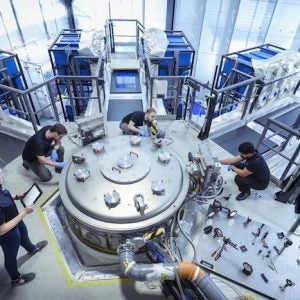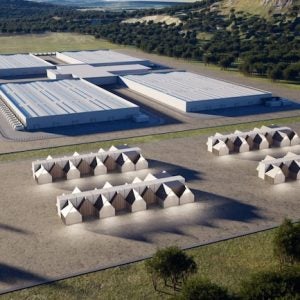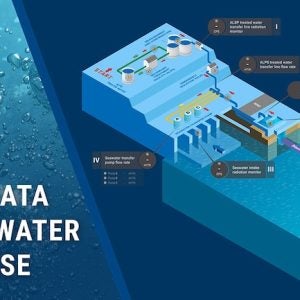 Westinghouse Electric Co has filed a lawsuit against Korea Hydro & Nuclear Power (KHNP) and Korea Electric Power Corp. (KEPCO) in federal court to block them from selling reactors to Poland.
Westinghouse Electric Co has filed a lawsuit against Korea Hydro & Nuclear Power (KHNP) and Korea Electric Power Corp. (KEPCO) in federal court to block them from selling reactors to Poland.
In a legal filing, Westinghouse said KHNP’s reactor design includes intellectual property licensed by Westinghouse and requires permission from Westinghouse before being transferred to Poland and any other countries considering deploying the APR1400 reactor. The filing was made after Westinghouse learned that Warsaw was preparing to sign a preliminary agreement to buy reactors from KHNP. Poland is currently evaluating offers from Westinghouse, KHNP and France’s EDF for its first commercial nuclear power plant.
Six pressurised water reactors are scheduled to be built in Poland and the government is planning to select a supplier by the end of the year. Westinghouse and KHNP are also competing for newbuild projects in the Czech Republic while KHNP is also participating in the tender to supply Saudi Arabia with its first NPP.
After receiving proposals from EDF, KHNP and Westinghouse Poland's government said in mid-October it would make a decision on within weeks. Polish media, citing unnamed government sources, reported that the lowest price was offered by KHNP, with Westinghouse's AP1000 reactor design being more expensive and EDF’s EPR2 the most expensive of the three. According to Polish media, KHNP could construct six 1.4GWe reactors at a total cost of $26.7 billion compared $31.3 billion for Westinghouse and $33 billion for EDF. KHNP also proposed post-construction technology transfer to Poland.
However, Korea times quoted “market watchers” as saying the Polish government “appears eager” to choose Westinghouse for state-initiated projects given the need to improve ties with the US, while considering the KHNP for private projects. According to Polish and Korean press reports, KHNP is expected to build a second nuclear power plant in Poland in Pątnów, while the first plant in Pomerania is to be built by Westinghouse.
PAP reported on 19 October that state-controlled power utility Polska Grupa Energetyczna (PGE) and listed private power plant operator ZE PAK planned to sign a letter of intent with KHNP on building the second plant at the end of October. PAP said a preliminary agreement would be signed within two weeks, and that the state treasury would have an "indirect majority stake in the project. A joint consortium is to implement a project in Pątnów, according to Rzeczpospolita. The project is to replace ZEPAK’s lignite power plant in Patnow with one or more nuclear reactors. The lignite power plant is expected to close in 2024.
It was this that reportedly prompted the Westinghouse lawsuit, which is based on a claim that intellectual property in KHNP’s APR1400 reactor design incorporates technology from the System 80 reactor design it acquired in 2000 from Westinghouse and that Westinghouse has intellectual property rights as a result.
Westinghouse claimed in the lawsuit that KHNP conceded this when it sold four APR1400 reactors to the United Arab Emirates in 2010.
Westinghouse is seeking to force KHNP to comply with US laws restricting nuclear power technology sharing. Under these rules – Part 810 requirements (10CFR810) – the US Department of Energy has statutory responsibility for authorising the transfer of unclassified nuclear technology and assistance to foreign atomic energy activities within the USA or abroad.
S&P Global reported on 23 October that Westinghouse had asked the court to issue a judgment that the APR1400 reactor contains US-origin technology that is subject to DOE review under 10CFR810. Westinghouse also asked the court to enjoin KHNP from sharing technical information covered by Part 810 with Poland or with authorities in the Czech Republic or Saudi Arabia.
However, KHNP disagrees. “After launching its own nuclear programme, Korea gradually built up technology, carrying out research and development projects with long-term plans for over 30 years. Thanks to this process, it gained competence in the design, production and construction of nuclear power plants in order to finally develop her own, independent technology,” the company said.
KHNP emphasised that when exporting Korean nuclear power plants to Poland, it will fully use its own nuclear technology developed by Korean companies, to which we have full intellectual property rights. "Korean nuclear technology is independent of Westinghouse technology and can be exported without restrictions and without the consent of the US," it noted.
The KHNP said it will exert maximum efforts to respond appropriately to the recent developments. It is time for the government and the state-run companies to double down on winning the projects while minimising the dispute with the US. KEPCO and KHNP said in a joint statement that they will continue efforts to remove any complications in the exports of the country's nuclear power plants. "We are aware of the lawsuit. We will outline strategies to respond to the developments in a timely and appropriately manner," they said.
The lawsuit will undoubtedly add fire to the ongoing trade dispute after the USA legislated the Inflation Reduction Act calling for the exclusion of Korean-made electric vehicles from tax incentives. In May, Korean President Yoon Suk-yeol and US President Joe Biden had agreed to strengthen cooperation to jointly advance into overseas nuclear reactor markets. However, “the "nuclear reactor alliance is facing hurdles due to Westinghouse's self-centred trade policy,” Korea Times noted on 26 October.
The paper cited an industry official “who refused to be identified” as saying: "Money trumps alliances. Maintaining amicable diplomatic relations is important, but not as much as financial interests in make-or-break business opportunities that can generate stable sources of income for at least a few years."
Image: Shin Kori units 3 and 4 (courtesy of KHNP)






